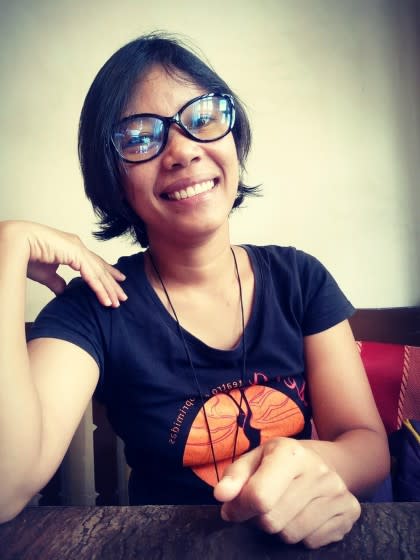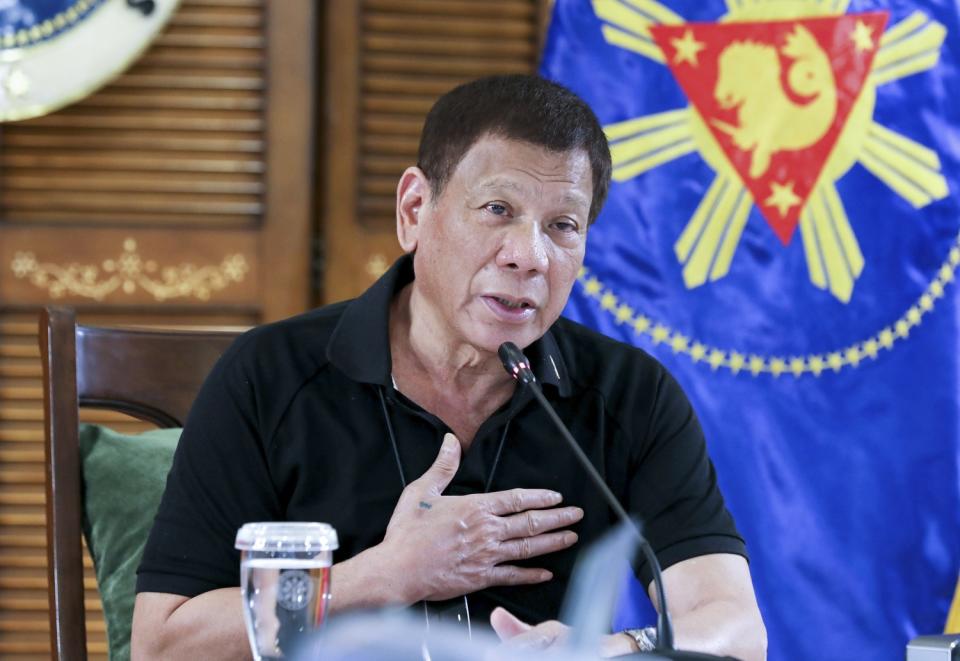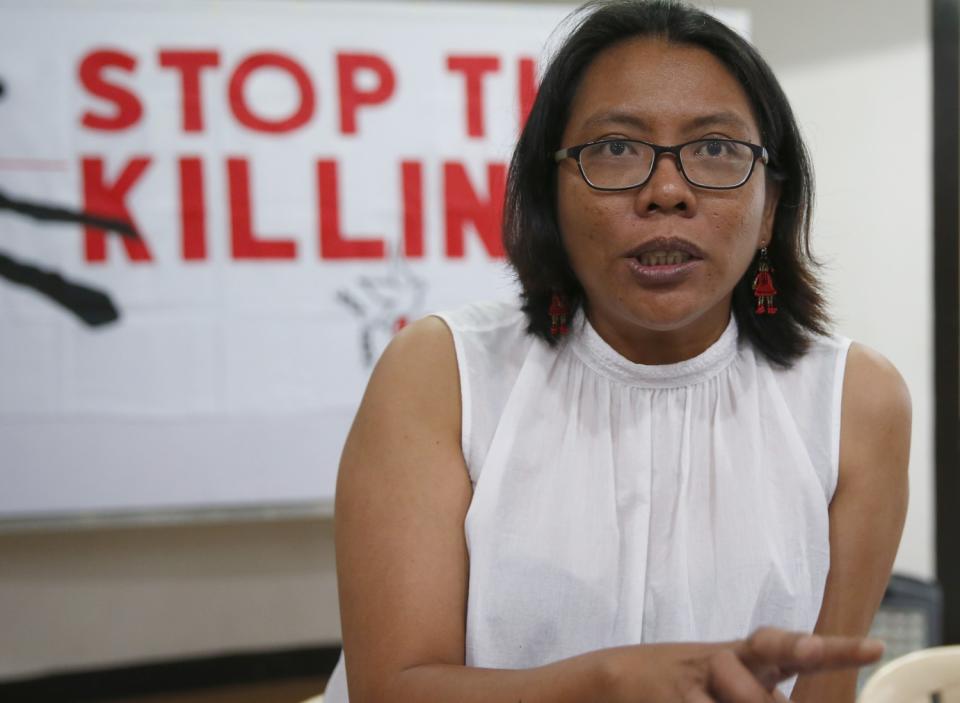Philippine human rights workers are being systematically killed in a growing war on dissent

Ever since Clarizza Singson appeared on a police hit list of suspected communists, the human rights worker from the impoverished Philippine island of Negros has taken precautions and trained herself to suppress her fears of dying at the hands of authorities.
She and her family will not eat at restaurants or attend parties. She pays close attention to her surroundings and avoids being alone outdoors, particularly at night. Seizing what little control she has over her safety helps keep the terror at bay.
“You don’t know where and you don’t know when it could happen,” Singson, 41, the regional secretary general of the Philippine rights group Karapatan, said of a potential hit. “We cannot live a normal life.”
Singson’s resolve was being tested like never before after her friend and colleague of nearly two decades, Zara Alvarez, was shot and killed Aug. 17 on the streets of Negros’ biggest city, Bacolod.
Minutes after Alvarez's slaying, a message appeared on Singson’s Facebook page saying, “Don’t worry, you’re next.”
Alvarez, a 39-year-old paralegal, was gunned down while walking to her boarding house by an assailant who fled on the back of a motorcycle. She was the fifth person on the hit list killed.
The mother of an 11-year-old girl, Alvarez was the 13th member of Karapatan slain since President Rodrigo Duterte took office in 2016. She is also the 90th suspected victim of extrajudicial killing in Negros over that time. The list of those killed includes farmers, lawyers and civilian officials who have challenged the island’s almost feudal hacienda system that’s pitted landowners against peasants since the days of Spanish rule 300 years ago.
Their deaths highlight the worsening conditions for some of the most vulnerable Filipinos under the Duterte administration, which has assailed human rights in a way unseen since former dictator Ferdinand Marcos imposed martial law on the country from 1972 to 1981.
It's estimated that up to 25,000 Filipinos have died in extrajudicial or vigilante killings during Duterte’s zero tolerance war on drugs — a brutal campaign felt almost exclusively in the nation’s slums that continues to win the president plaudits among his still sizable base of support.

The populist leader, who rode into office with the sharp-tongued swagger of a mafia boss, has consolidated power by jailing political opponents, shuttering independent media outlets and sidelining the influence of the Catholic Church.
The COVID-19 pandemic has tightened his control with lockdowns enforced by armed soldiers ordered to shoot those who violate restrictions. An overly vague anti-terror law signed by Duterte in July gives the 75-year-old president broad new powers to target anyone who opposes his administration.
Duterte has suffered few consequences on the world stage for the country’s slide toward authoritarianism — even with the recent publication of a report by the United Nations high commissioner for human rights in June detailing widespread abuse, including the verified killings of 248 human rights defenders, journalists, lawyers and trade unionists mostly under his presidency. The government has denied involvement.
The Trump administration, which needs the Philippines to counter China’s rising influence, has not condemned Duterte’s human rights record. Congress has ignored calls to block or delay nearly $2 billion in U.S. arms sales to the country this year.
Without international pressure, experts say Duterte will continue crushing dissent as he tries to deflect attention from a crashing economy and a pandemic spinning out of control.
Negros, in particular, has borne the brunt of Duterte’s embrace of autocratic rule.
The fourth-biggest island (roughly the size of Connecticut) in the country of 108 million has been a testing ground for Duterte’s counter-insurgency program, which has given the military near-unchecked authority in rural provinces.
Negros has long been a center of activism and a base for the New People’s Army. The communist insurgency has simmered for more than half a century because of entrenched poverty and violent suppression of farmers in a region famous for producing half the country’s sugar.
At the root of the conflict is land ownership, a problem that has fueled the extreme divide between rich and poor for centuries.
Negros’ fertile soil is in the hands of only a few wealthy families and corporations. Bids to reform the inequities have been foiled by buyback schemes that coerce farmers, some earning only $2 a day, into selling their land back to previous owners at vastly reduced prices.
Those who try to challenge the system are often killed or silenced by landowners’ goons, or plainclothes police and military intelligence agents working on their behalf, activists say.
In one of the worst cases, nine sugar farmers, including three women and two teenage children, were massacred by gunmen while trying to cultivate idle land to grow food in northern Negros.
The October 2018 incident was followed a month later by the killing of Benjamin Ramos, a human rights lawyer and Karapatan member, who tried to stop the land-buyback scheme. Ramos was shot by two hooded gunmen outside his office in central Negros. The attack took place seven months after Ramos first appeared on the hit list of suspected communists with Alvarez and Singson, which was circulated in a poster displayed in public buildings.
By accusing human rights defenders of being communists, authorities are trying to equate advocacy work with terrorism — a process known as red-tagging that invites harassment and assassination. Calls for justice in the deaths of Ramos and other activists have gone nowhere.
“The key problem here is that state security forces do not make the distinction between loudmouthed activists in the streets and guerrilla fighters in the mountains,” said Carlos Conde, Philippines researcher for Human Rights Watch. “They know there’s a distinction, but they choose to blur it because they are convinced support for the [New People's Army] comes from the cities and that people are being recruited and brainwashed by activists.
“These people targeted are not combatants,” Conde added. “They are not directly involved in the armed struggle in the countryside. Targeting them is a violation of human rights. They’re being pulled into this vortex of violence.”
Karapatan members had just attended the funeral of Randall Echanis, a 72-year-old agrarian activist tortured and stabbed to death in his Manila apartment earlier this month, when they learned of Alvarez’s slaying.
Family and colleagues frantically called Alvarez’s phone on the chance that early reports had mistaken the victim’s identity. But when photos from the scene emerged showing a diminutive woman with a bob haircut, they knew she was gone.
“She was a little giant,” said Cristina Palabay, the Manila-based secretary general of Karapatan. “She looks so unassuming, but she would exude so much passion. We called her a child of Negros. She had so much empathy for the people there.”

As a paralegal, Alvarez documented rights violations and helped prepare the defense of political prisoners. Her activism was born out of her upbringing in the church. Her mother was a catechist at her local parish who instilled in Alvarez lessons in human dignity for the poor, friends said.
Church bells in parts of Negros have tolled each night at 6 p.m. in mourning since Alvarez died. Dozens attended her funeral Wednesday wearing black T-shirts calling for justice in her killing.
A spokesman for the Duterte administration condemned the killings of rights activists in a statement Monday, and the Philippine Department of Justice said it had opened an inquiry.
Singson said Alvarez and she would often discuss the difficulties of reconciling their responsibilities as parents with the dangers of their work. They were godparents to each other’s children. When Alvarez’s daughter texted Singson the night of her mother’s killing asking if the news was true, Singson was left frozen in grief.
“I couldn’t find the words,” she said.
Palabay said human rights defenders in the Philippines had a long history as victims of deadly oppression yet still found the nerve to carry on out of a sense of responsibility. It’s why Alvarez rebuffed offers to seek asylum abroad, she said.
“The most natural reaction is fear,” said Palabay. “Especially when your life is threatened and your family is threatened. What has driven Zara to wake up each day and do her work despite the threats hanging over her head was the fact so many people needed her. She couldn’t afford to be immobilized by fear.”

